Anticancer action of plant products: changing stereotyped attitudes
Compared to humans, plants can synthesize an extremely diverse array of chemical compounds, including phenolic acids, flavonoids, stilbenes, lignans, terpenoids, alkaloids, and many other types of s
[...] Read more.
Compared to humans, plants can synthesize an extremely diverse array of chemical compounds, including phenolic acids, flavonoids, stilbenes, lignans, terpenoids, alkaloids, and many other types of secondary metabolites that have been demonstrated to exert important bioactivities and impacts on the human health. As a result of extensive and sustained efforts, some phytochemicals like vincristine, vinblastine, and paclitaxel have already been approved as anticancer drugs today, while several others are under clinical trials. However, despite this remarkable success, studies on anticancer action of plant-derived products have been and paradoxically are still in some places, mixed up with alternative approaches and thereby considered non-credible, especially in regions where the role of traditional medicine has not been historically so prevalent as in several Asian countries. As a result, only about 10% of higher plants have been explored regarding the potential therapeutic effects of their constituents. Moreover, as one function of secondary metabolites includes the protection of plants against diverse environmental stresses, the content and composition of these phytochemicals might importantly vary between different regional habitats. Therefore, the stereotyped attitudes to plant products as something related to alternative medicine must be changed to identify new lead molecules for novel anticancer drugs. It is possible that plants still harbor an important spectrum of pharmaceutically interesting, but still unidentified, chemical compounds.
Katrin Sak
Compared to humans, plants can synthesize an extremely diverse array of chemical compounds, including phenolic acids, flavonoids, stilbenes, lignans, terpenoids, alkaloids, and many other types of secondary metabolites that have been demonstrated to exert important bioactivities and impacts on the human health. As a result of extensive and sustained efforts, some phytochemicals like vincristine, vinblastine, and paclitaxel have already been approved as anticancer drugs today, while several others are under clinical trials. However, despite this remarkable success, studies on anticancer action of plant-derived products have been and paradoxically are still in some places, mixed up with alternative approaches and thereby considered non-credible, especially in regions where the role of traditional medicine has not been historically so prevalent as in several Asian countries. As a result, only about 10% of higher plants have been explored regarding the potential therapeutic effects of their constituents. Moreover, as one function of secondary metabolites includes the protection of plants against diverse environmental stresses, the content and composition of these phytochemicals might importantly vary between different regional habitats. Therefore, the stereotyped attitudes to plant products as something related to alternative medicine must be changed to identify new lead molecules for novel anticancer drugs. It is possible that plants still harbor an important spectrum of pharmaceutically interesting, but still unidentified, chemical compounds.
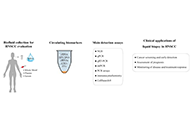 Clinical applications of liquid biopsy in HPV-negative and HPV-positive head and neck squamous cell carcinoma: advances and challengesOpen AccessReviewHead and neck squamous cell carcinomas (HNSCCs) represent the most common epithelial tumors that arise from mucosa of the oral cavity, pharynx, and larynx. The development of HNSCCs is usually assoc [...] Read more.Mariana Chantre-Justino ... Lucas DelmonicoPublished: August 31, 2022 Explor Target Antitumor Ther. 2022;3:533–552
Clinical applications of liquid biopsy in HPV-negative and HPV-positive head and neck squamous cell carcinoma: advances and challengesOpen AccessReviewHead and neck squamous cell carcinomas (HNSCCs) represent the most common epithelial tumors that arise from mucosa of the oral cavity, pharynx, and larynx. The development of HNSCCs is usually assoc [...] Read more.Mariana Chantre-Justino ... Lucas DelmonicoPublished: August 31, 2022 Explor Target Antitumor Ther. 2022;3:533–552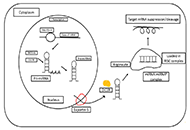 miRNA therapeutics in precision oncology: a natural premium to nurtureOpen AccessReviewThe dynamic spectrum of microRNA (miRNA) has grown significantly over the years with its identification and exploration in cancer therapeutics and is currently identified as an important resource fo [...] Read more.Chakresh Kumar Jain ... R Suresh KumarPublished: August 31, 2022 Explor Target Antitumor Ther. 2022;3:511–532
miRNA therapeutics in precision oncology: a natural premium to nurtureOpen AccessReviewThe dynamic spectrum of microRNA (miRNA) has grown significantly over the years with its identification and exploration in cancer therapeutics and is currently identified as an important resource fo [...] Read more.Chakresh Kumar Jain ... R Suresh KumarPublished: August 31, 2022 Explor Target Antitumor Ther. 2022;3:511–532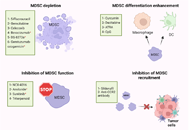 Myeloid-derived suppressor cells in colorectal cancer: prognostic biomarkers and therapeutic targetsOpen AccessReviewMyeloid-derived suppressor cells (MDSCs) are a group of immature myeloid cells, which are expanded in most cancer patients. MDSCs suppress host immune responses, leading to cancer growth and progres [...] Read more.Mohammad A. Al-Mterin, Eyad ElkordPublished: August 31, 2022 Explor Target Antitumor Ther. 2022;3:497–510
Myeloid-derived suppressor cells in colorectal cancer: prognostic biomarkers and therapeutic targetsOpen AccessReviewMyeloid-derived suppressor cells (MDSCs) are a group of immature myeloid cells, which are expanded in most cancer patients. MDSCs suppress host immune responses, leading to cancer growth and progres [...] Read more.Mohammad A. Al-Mterin, Eyad ElkordPublished: August 31, 2022 Explor Target Antitumor Ther. 2022;3:497–510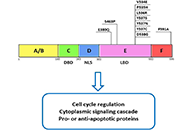 Endocrine therapy resistance: what we know and future directionsOpen AccessReviewEndocrine resistance is a major hurdle in the treatment of estrogen receptor (ER)-positive breast cancer. When abnormally regulated, molecular signals responsible for cellular proliferation, as well [...] Read more.David Musheyev, Anya AlayevPublished: August 31, 2022 Explor Target Antitumor Ther. 2022;3:480–496
Endocrine therapy resistance: what we know and future directionsOpen AccessReviewEndocrine resistance is a major hurdle in the treatment of estrogen receptor (ER)-positive breast cancer. When abnormally regulated, molecular signals responsible for cellular proliferation, as well [...] Read more.David Musheyev, Anya AlayevPublished: August 31, 2022 Explor Target Antitumor Ther. 2022;3:480–496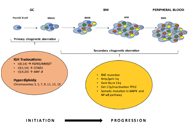 A personalized molecular approach in multiple myeloma: the possible use of RAF/RAS/MEK/ERK and BCL-2 inhibitorsOpen AccessReviewMultiple myeloma (MM) is a blood cancer that derives from plasma cells (PCs), which will accumulate in the bone marrow (BM). Over time, several drugs have been developed to treat this disease that i [...] Read more.Vincenzo Raimondi ... Nicola GiulianiPublished: August 31, 2022 Explor Target Antitumor Ther. 2022;3:463–479
A personalized molecular approach in multiple myeloma: the possible use of RAF/RAS/MEK/ERK and BCL-2 inhibitorsOpen AccessReviewMultiple myeloma (MM) is a blood cancer that derives from plasma cells (PCs), which will accumulate in the bone marrow (BM). Over time, several drugs have been developed to treat this disease that i [...] Read more.Vincenzo Raimondi ... Nicola GiulianiPublished: August 31, 2022 Explor Target Antitumor Ther. 2022;3:463–479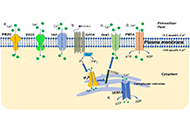 Roles of calcium signaling in cancer metastasis to boneOpen AccessReviewBone metastasis is a frequent complication for cancers and an important reason for the mortality in cancer patients. After surviving in bone, cancer cells can cause severe pain, life-threatening hyp [...] Read more.Tianying Xie ... Jianru XiaoPublished: August 31, 2022 Explor Target Antitumor Ther. 2022;3:445–462
Roles of calcium signaling in cancer metastasis to boneOpen AccessReviewBone metastasis is a frequent complication for cancers and an important reason for the mortality in cancer patients. After surviving in bone, cancer cells can cause severe pain, life-threatening hyp [...] Read more.Tianying Xie ... Jianru XiaoPublished: August 31, 2022 Explor Target Antitumor Ther. 2022;3:445–462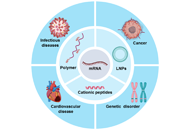 Applications and challenges of biomaterial mediated mRNA deliveryOpen AccessReviewWith the rapid development of gene therapy technology and the outbreak of coronavirus disease 2019 (COVID-19), messenger RNA (mRNA) therapeutics have attracted more and more attention, and the COVID [...] Read more.Huapan Fang, Qian ChenPublished: August 31, 2022 Explor Target Antitumor Ther. 2022;3:428–444
Applications and challenges of biomaterial mediated mRNA deliveryOpen AccessReviewWith the rapid development of gene therapy technology and the outbreak of coronavirus disease 2019 (COVID-19), messenger RNA (mRNA) therapeutics have attracted more and more attention, and the COVID [...] Read more.Huapan Fang, Qian ChenPublished: August 31, 2022 Explor Target Antitumor Ther. 2022;3:428–444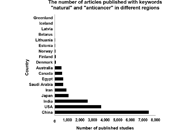 Anticancer action of plant products: changing stereotyped attitudesOpen AccessPerspectiveCompared to humans, plants can synthesize an extremely diverse array of chemical compounds, including phenolic acids, flavonoids, stilbenes, lignans, terpenoids, alkaloids, and many other types of s [...] Read more.Katrin SakPublished: August 15, 2022 Explor Target Antitumor Ther. 2022;3:423–427
Anticancer action of plant products: changing stereotyped attitudesOpen AccessPerspectiveCompared to humans, plants can synthesize an extremely diverse array of chemical compounds, including phenolic acids, flavonoids, stilbenes, lignans, terpenoids, alkaloids, and many other types of s [...] Read more.Katrin SakPublished: August 15, 2022 Explor Target Antitumor Ther. 2022;3:423–427 Consequences of the impact of COVID-19 pandemic on breast cancer at a single Italian institutionOpen AccessOriginal ArticleAim: To evaluate the local impact of the coronavirus disease 2019 (COVID-19) pandemic on breast cancer (BC) care, with particular attention to the economical and psychological consequences of the [...] Read more.Daniele Ugo Tari ... Fabio PintoPublished: July 29, 2022 Explor Target Antitumor Ther. 2022;3:414–422
Consequences of the impact of COVID-19 pandemic on breast cancer at a single Italian institutionOpen AccessOriginal ArticleAim: To evaluate the local impact of the coronavirus disease 2019 (COVID-19) pandemic on breast cancer (BC) care, with particular attention to the economical and psychological consequences of the [...] Read more.Daniele Ugo Tari ... Fabio PintoPublished: July 29, 2022 Explor Target Antitumor Ther. 2022;3:414–422